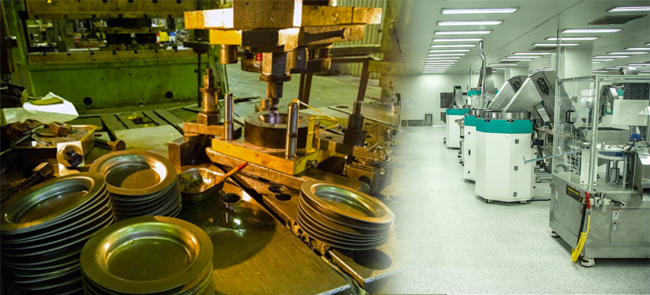
With its many advantages, such as sustainability, lightweight, durability, corrosion resistance, and design flexibility, aluminum casting is a method that is essential to the hospitality sector. Aluminum casting makes it possible to create objects that are both aesthetically pleasing and utilitarian, from kitchenware and appliances to architectural elements and furniture. It is an essential component in the contemporary hotel industry, where every little detail matters in producing a remarkable visitor experience, because of its function in fostering design innovation and brand identification. Aluminum casting's adaptability guarantees that it will continue to lead design and construction for many years to come as the hospitality sector develops.
Yogiraj Alucast is the Manufacturer, Supplier, Exporter of Aluminium Gravity Die Castings (Aluminium GDC) Machined Parts / Components / Spares for Hotel And Food Industries and Our set up is in Kolhapur, Maharashtra, India
In addition to being aesthetically pleasing, materials used in the Hotel and Food industry must be resilient to the demands of heavy traffic, deterioration, and challenging conditions.
There are many advantages to aluminum casting for this industry, such as:
- Lightweight and Durability: Aluminum is easy to handle and install in a variety of settings since it is significantly lighter than other metals like steel. Aluminum is very strong and resilient, able to withstand the rigors of both indoor and outdoor settings despite its small weight. This implies that aluminum fixtures, furnishings, and other elements are less likely to sustain damage from regular use in hospitality situations.
- Corrosion Resistance: High humidity levels are common in the Hotel and Food industry, especially in places like kitchens, swimming pools, and beachside resorts. Because of its inherent resistance to corrosion, aluminum is a perfect material for these kinds of settings. Because aluminum does not rust like steel does, even under extreme circumstances, its parts keep their look and performance.
- Design Flexibility: The capacity to create complicated shapes and elaborate designs is one of the major benefits of aluminum casting. This allows designers the freedom to produce distinctive, personalized items that complement the style of a hotel, restaurant, or other hospitality facility or the identity of a business. Aluminum casting enables the highly precise realization of creative ideas, whether they are for a custom door handle, a distinctive lighting fixture, or an elaborately designed table base.
- Sustainability: One of the most environmentally friendly materials is aluminum. Recycling aluminum uses only 5% of the energy required to make it from raw materials, and it can be recycled 100% of the time without losing its qualities. Aluminum casting provides a solution that fits with the environmentally conscientious ideals of many hospitality businesses in a world where sustainability is becoming more and more important.
- Cost-Effectiveness: The long-term advantages of casting aluminum outweigh the initial expense, even though it may be more expensive than some other materials. Aluminum's endurance, low maintenance, and resilience lower replacement and repair costs, making it an economical option for the hospitality sector over time. Furthermore, aluminum's capacity to be recycled lowers trash and related disposal expenses, increasing its economic attractiveness.
There are several uses for aluminum casting in the hotel sector. There are countless applications for this adaptable material, including kitchenware, furniture, décor, and construction.
Some of the main applications for aluminum casting are listed below:
Aluminum is frequently used to create unique fixtures and furniture in Hotel and Food Industry. Unique, well- made furniture that can endure frequent use and improve the overall aesthetics of the room is frequently sought for by hotels, restaurants, and resorts. Designers may make unique tables, seats, stools, and even storage units that satisfy the venue's requirements thanks to aluminum casting.
- Tables and Chairs: Because of their strength and capacity to sustain large weights, aluminum bases and frames are frequently utilized in the construction of tables and chairs. Custom designs may include basic styles or elaborate details depending on the subject of the location.
- Lighting Fixtures: For creating intricate, high-quality lighting designs, aluminum casting is perfect. Aluminum offers strength and aesthetic versatility in these crucial components of hospitality design, whether they are smart sconces, modern pendants, or exquisite chandeliers.
- Door Handles and Hardware: Even minor details like door handles and hardware are thoughtfully crafted in upscale hospitality spaces. Custom handles, hinges, locks, and other hardware elements that improve the space's overall design can be made thanks to aluminum casting.
- Outdoor Furniture: Outdoor tables, seats, and benches that must be both weatherproof and comfortable for visitors are frequently made of aluminum. Cast aluminum furniture is a popular option for outdoor settings since it is incredibly durable and low maintenance.
- Outdoor Fixtures and Fittings: For outdoor areas, cast aluminum is frequently used for lighting fixtures, signage, and even ornamental features like fountains and statues. Aluminum's natural qualities guarantee that these products will withstand the weather without degrading.
Aluminum casting is used for several architectural elements in the construction of hospitality venues. Aluminum provides both structural strength and aesthetic appeal in everything from building framework to decorative embellishments. It can be molded into intricate shapes and forms, making it suitable for a variety of applications, including balustrades, elaborate decorative panels, and curtain wall systems.
- Curtain Walls and Facades: Curtain walls, the non-structural exterior walls of buildings that provide both visual appeal and weather protection, are frequently made of aluminum. These walls typically have elaborate finishes or patterns cast into them, giving the building's façade a distinctive flair.
- Balustrades and Railings: Aluminum is frequently used for railings and balustrades in restaurants, hotels, and resorts with balconies or staircases. Both decorative and utilitarian elements are required, and casting offers the opportunity to produce unique designs that complement the venue's aesthetic goals.
- Decorative Elements: Custom signs, wall art, and outdoor sculptures are just a few examples of the distinctive ornamental components that may be made using aluminum casting to improve a space's atmosphere. These components frequently aid in creating a distinctive brand identity for the location.